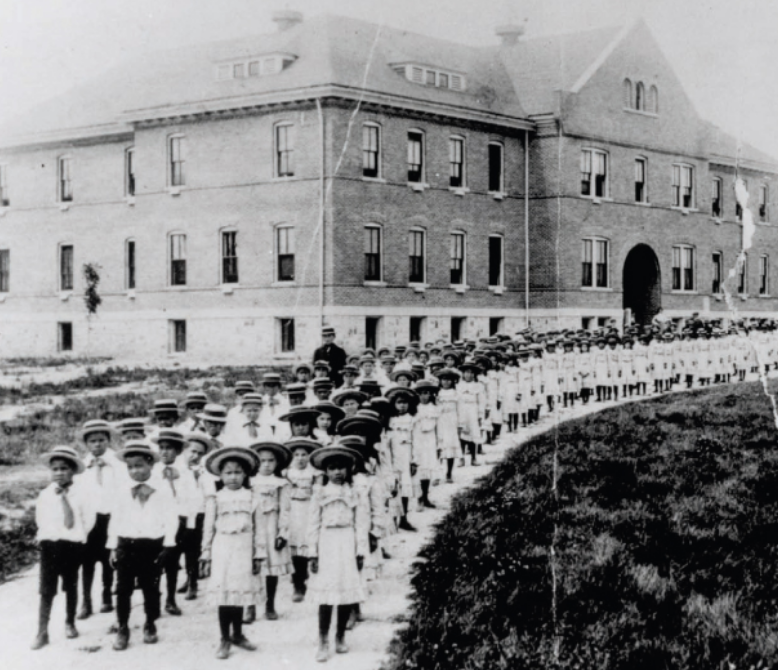
- Details
- By Neely Bardwell
Buried in the State of Michigan’s 2023 Budget Proposal, revealed earlier this month by Michigan Gov. Gretchen Whitmer (D), is a one-paragraph insertion that calls for a one-time appropriation for $500,000 to conduct a boarding school study.
The proposed appropriation reads, “a statewide study will be performed to research the number of Native American children forced to attend boarding schools in Michigan, the number of children who were abused, died, or went missing while at these schools, and the long-term impacts on these children and the families of children forced to attend such schools.”
Want more Native News? Get the free daily newsletter today.
The study is to be completed by January 30, 2024 and shall provide a final report on findings and recommendations that are to be shared with the general public and State of Michigan.
According to the paragraph, the study “should work in concert” with the Federal Indian Boarding School Initiative established last June by U.S. Secretary of the Interior Deb Haaland (Laguna Pueblo). When it was established, the Interior Dept. used similar language to spell out the work of the federal initiative. Its findings are due to the Sec. Haaland by April 1, 2022.
Beyond a one-paragraph insertion into the proposed budget, little was revealed as to how the study will be performed or what entity will perform the actual work associated with the study. A call by Native News Online to the Governor’s Office was not returned by press time.
According to Michigan tribal officials, Gov. Whitmer had the boarding school study inserted into the state budget after she met with the state’s 12 federally recognized tribes last September. All 12 tribal leaders expressed the need for such a study in Michigan.
There were at least three known schools in the state of Michigan that are now closed: Holy Childhood of Jesus in Harbor Springs; Holy Name in Baraga; and the Mt. Pleasant Indian School in Mt. Pleasant. Each of these schools had around 200-300 children attend per year. All of these schools have known cemeteries. The last of these schools to close was Holy Childhood, which finally closed its doors in 1983.
Each year, the Michigan State Legislature must approve the budget submitted by the Michigan governor. The lawmakers we contacted are hopeful that this budget will pass with this addition. However, state Senator Irwin (D-18th District), a citizen of the Sault Ste. Marie Tribe of Indians, says he is sure there will be some opposition from the Conservative counterparts.
He also strongly supports the study and believes that the Catholic Diocese should cooperate with this study saying:
“If they’ll cooperate and engage in good faith, I also think that religious organizations such as the Catholic diocese of Michigan need to be involved and turn over any information they have relating to their role in operating these schools.”
Michigan state Representative Rachel Hood (D-76th District) also expresses her support for this addition saying:
“We must work every day to right the wrongs perpetrated against our Indigenous neighbors. I applaud the Governor’s request for a study of native boarding schools in the Department of Civil Rights executive budget recommendation.” She also explains specifically what she wants to see brought to light in the study. “We must study the number of children who were forced to attend these schools, the number of children who passed away, went missing, or were abused in these schools as well as the generational impacts these schools have had on our state's Indigenous communities.”
The boarding school era has always been a dark stain on America’s history. This is a big step in the effort to find answers and uncover the true history behind the boarding schools. It will allow Native communities to receive the answers they’ve been searching for, and it will help educate those who are unaware of the history.
Chairperson Aaron Payment, Sault Ste. Marie Tribe of Indians, says, “I appreciate the Governor’s leadership and commitment here,” Payment goes on to say “We are entering an era of truth and reconciliation. This will be a challenging time requiring us to take a hard look at the stark history, but not for the purposes of blame, but instead to identify what is needed to heal.”
Tell Us What You Think
More Stories Like This
Native News Weekly (August 25, 2024): D.C. BriefsUS Presidents in Their Own Words Concerning American Indians
This Day in History — Dec. 29, 1890: Hundreds of Lakota Killed During the Wounded Knee Massacre
Monday Morning (December 29, 2025): Articles You May Have Missed This Past Weekend
Native News Weekly (December 28, 2025): D.C. Briefs
Help us defend tribal sovereignty.
At Native News Online, our mission is rooted in telling the stories that strengthen sovereignty and uplift Indigenous voices — not just at year’s end, but every single day.
Because of your generosity last year, we were able to keep our reporters on the ground in tribal communities, at national gatherings and in the halls of Congress — covering the issues that matter most to Indian Country: sovereignty, culture, education, health and economic opportunity.
That support sustained us through a tough year in 2025. Now, as we look to the year ahead, we need your help right now to ensure warrior journalism remains strong — reporting that defends tribal sovereignty, amplifies Native truth, and holds power accountable.
 The stakes couldn't be higher. Your support keeps Native voices heard, Native stories told and Native sovereignty defended.
The stakes couldn't be higher. Your support keeps Native voices heard, Native stories told and Native sovereignty defended.
Stand with Warrior Journalism today.
Levi Rickert (Potawatomi), Editor & Publisher

